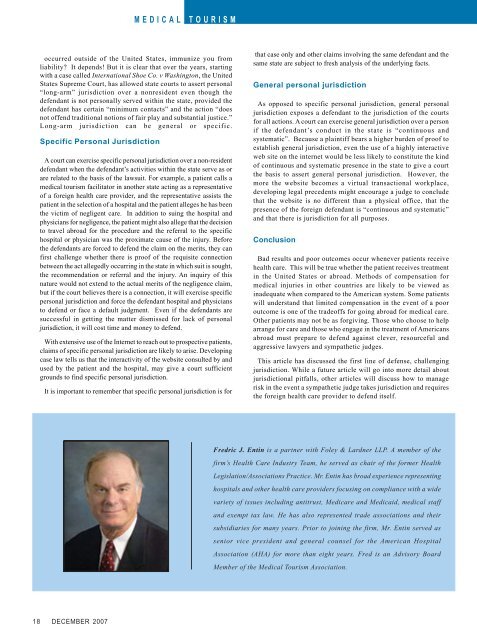Download PDF - Medical Tourism Magazine
Download PDF - Medical Tourism Magazine
Download PDF - Medical Tourism Magazine
You also want an ePaper? Increase the reach of your titles
YUMPU automatically turns print PDFs into web optimized ePapers that Google loves.
MEDICAL TOURISM<br />
occurred outside of the United States, immunize you from<br />
liability? It depends! But it is clear that over the years, starting<br />
with a case called International Shoe Co. v Washington, the United<br />
States Supreme Court, has allowed state courts to assert personal<br />
“long-arm” jurisdiction over a nonresident even though the<br />
defendant is not personally served within the state, provided the<br />
defendant has certain “minimum contacts” and the action “does<br />
not offend traditional notions of fair play and substantial justice.”<br />
Long-arm jurisdiction can be general or specific.<br />
Specific Personal Jurisdiction<br />
A court can exercise specific personal jurisdiction over a non-resident<br />
defendant when the defendant’s activities within the state serve as or<br />
are related to the basis of the lawsuit. For example, a patient calls a<br />
medical tourism facilitator in another state acting as a representative<br />
of a foreign health care provider, and the representative assists the<br />
patient in the selection of a hospital and the patient alleges he has been<br />
the victim of negligent care. In addition to suing the hospital and<br />
physicians for negligence, the patient might also allege that the decision<br />
to travel abroad for the procedure and the referral to the specific<br />
hospital or physician was the proximate cause of the injury. Before<br />
the defendants are forced to defend the claim on the merits, they can<br />
first challenge whether there is proof of the requisite connection<br />
between the act allegedly occurring in the state in which suit is sought,<br />
the recommendation or referral and the injury. An inquiry of this<br />
nature would not extend to the actual merits of the negligence claim,<br />
but if the court believes there is a connection, it will exercise specific<br />
personal jurisdiction and force the defendant hospital and physicians<br />
to defend or face a default judgment. Even if the defendants are<br />
successful in getting the matter dismissed for lack of personal<br />
jurisdiction, it will cost time and money to defend.<br />
With extensive use of the Internet to reach out to prospective patients,<br />
claims of specific personal jurisdiction are likely to arise. Developing<br />
case law tells us that the interactivity of the website consulted by and<br />
used by the patient and the hospital, may give a court sufficient<br />
grounds to find specific personal jurisdiction.<br />
It is important to remember that specific personal jurisdiction is for<br />
18 DECEMBER 2007<br />
that case only and other claims involving the same defendant and the<br />
same state are subject to fresh analysis of the underlying facts.<br />
General personal jurisdiction<br />
As opposed to specific personal jurisdiction, general personal<br />
jurisdiction exposes a defendant to the jurisdiction of the courts<br />
for all actions. A court can exercise general jurisdiction over a person<br />
if the defendant’s conduct in the state is “continuous and<br />
systematic”. Because a plaintiff bears a higher burden of proof to<br />
establish general jurisdiction, even the use of a highly interactive<br />
web site on the internet would be less likely to constitute the kind<br />
of continuous and systematic presence in the state to give a court<br />
the basis to assert general personal jurisdiction. However, the<br />
more the website becomes a virtual transactional workplace,<br />
developing legal precedents might encourage a judge to conclude<br />
that the website is no different than a physical office, that the<br />
presence of the foreign defendant is “continuous and systematic”<br />
and that there is jurisdiction for all purposes.<br />
Conclusion<br />
Bad results and poor outcomes occur whenever patients receive<br />
health care. This will be true whether the patient receives treatment<br />
in the United States or abroad. Methods of compensation for<br />
medical injuries in other countries are likely to be viewed as<br />
inadequate when compared to the American system. Some patients<br />
will understand that limited compensation in the event of a poor<br />
outcome is one of the tradeoffs for going abroad for medical care.<br />
Other patients may not be as forgiving. Those who choose to help<br />
arrange for care and those who engage in the treatment of Americans<br />
abroad must prepare to defend against clever, resourceful and<br />
aggressive lawyers and sympathetic judges.<br />
This article has discussed the first line of defense, challenging<br />
jurisdiction. While a future article will go into more detail about<br />
jurisdictional pitfalls, other articles will discuss how to manage<br />
risk in the event a sympathetic judge takes jurisdiction and requires<br />
the foreign health care provider to defend itself.<br />
Fredric J. Entin is a partner with Foley & Lardner LLP. A member of the<br />
firm’s Health Care Industry Team, he served as chair of the former Health<br />
Legislation/Associations Practice. Mr. Entin has broad experience representing<br />
hospitals and other health care providers focusing on compliance with a wide<br />
variety of issues including antitrust, Medicare and Medicaid, medical staff<br />
and exempt tax law. He has also represented trade associations and their<br />
subsidiaries for many years. Prior to joining the firm, Mr. Entin served as<br />
senior vice president and general counsel for the American Hospital<br />
Association (AHA) for more than eight years. Fred is an Advisory Board<br />
Member of the <strong>Medical</strong> <strong>Tourism</strong> Association.


